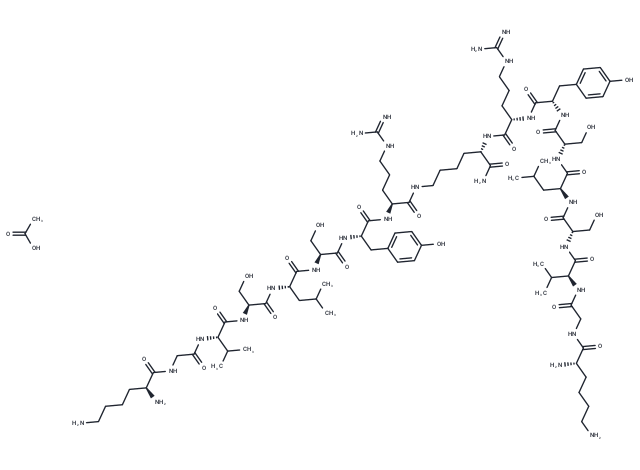Shopping Cart
- Remove All
 Your shopping cart is currently empty
Your shopping cart is currently empty

CTCE 9908 acetate is an antagonist of CXCR4 and inhibits migration in CXCR4-expressing ovarian cancer cells.

| Pack Size | Price | Availability | Quantity |
|---|---|---|---|
| 1 mg | $153 | In Stock | |
| 5 mg | $376 | In Stock | |
| 10 mg | $563 | In Stock | |
| 25 mg | $828 | In Stock | |
| 50 mg | $1,130 | In Stock | |
| 100 mg | $1,530 | In Stock | |
| 200 mg | $1,980 | In Stock |
| Description | CTCE 9908 acetate is an antagonist of CXCR4 and inhibits migration in CXCR4-expressing ovarian cancer cells. |
| In vitro | CTCE 9908 acetate inhibited ovarian cancer cell migration to CXCL12, but on longer incubation, caused cell death in CXCR4-positive cells. CTCE 9908 acetate did not cause apoptosis or cellular senescence, but induced multinucleation, G(2)-M arrest, and abnormal mitosis in ovarian cancer cells. CTCE 9908 acetate deregulated DNA damage checkpoint proteins and spindle assembly checkpoint proteins at G(2)-M phases of the cell cycle. Combination treatment of CTCE 9908 acetate and the drug paclitaxel led to an additive cytotoxicity that also involved mitotic catastrophe[1]. |
| In vivo | In dosing experiment of CTCE 9908 acetate in the PyMT mouse model, increasing doses of CTCE 9908 acetate alone slowed the rate of tumor growth, with a 45% inhibition of primary tumor growth at 3.5 weeks of treatment with 50 mg/kg of CTCE 9908 acetate (p = 0.005). Expression levels of VEGF were also found to be reduced by 42% with CTCE 9908 acetate (p = 0.01). In combination with docetaxel, CTCE 9908 acetate administration decreased tumor volume by 38% (p = 0.02), an effect that was greater than that observed with docetaxel alone. In combination with DC101, CTCE 9908 acetate also demonstrated an enhanced effect compared to DC101 alone, with a 37% decrease in primary tumor volume (p = 0.01) and a 75% reduction in distant metastasis (p = 0.009). In combination with docetaxel or an anti-angiogenic agent, the anti-tumor and anti-metastatic effects of CTCE 9908 acetate were markedly enhanced[2]. |
| Molecular Weight | 1987.31 |
| Formula | C88H151N27O25 |
| Smiles | CC(O)=O.O=C(N)[C@H](CCCCNC([C@H](CCCNC(N)=N)NC([C@H](CC1=CC=C(O)C=C1)NC([C@H](CO)NC([C@H](CC(C)C)NC([C@H](CO)NC([C@H](C(C)C)NC(CNC([C@H](CCCCN)N)=O)=O)=O)=O)=O)=O)=O)=O)NC([C@H](CCCNC(N)=N)NC([C@H](CC2=CC=C(O)C=C2)NC([C@H](CO)NC([C@H](CC(C)C)NC([C@H](CO)NC([C@H](C(C)C)NC(CNC([C@H](CCCCN)N)=O)=O)=O)=O)=O)=O)=O)=O |
| Storage | keep away from moisture | Powder: -20°C for 3 years | In solvent: -80°C for 1 year | Shipping with blue ice. |

Copyright © 2015-2025 TargetMol Chemicals Inc. All Rights Reserved.